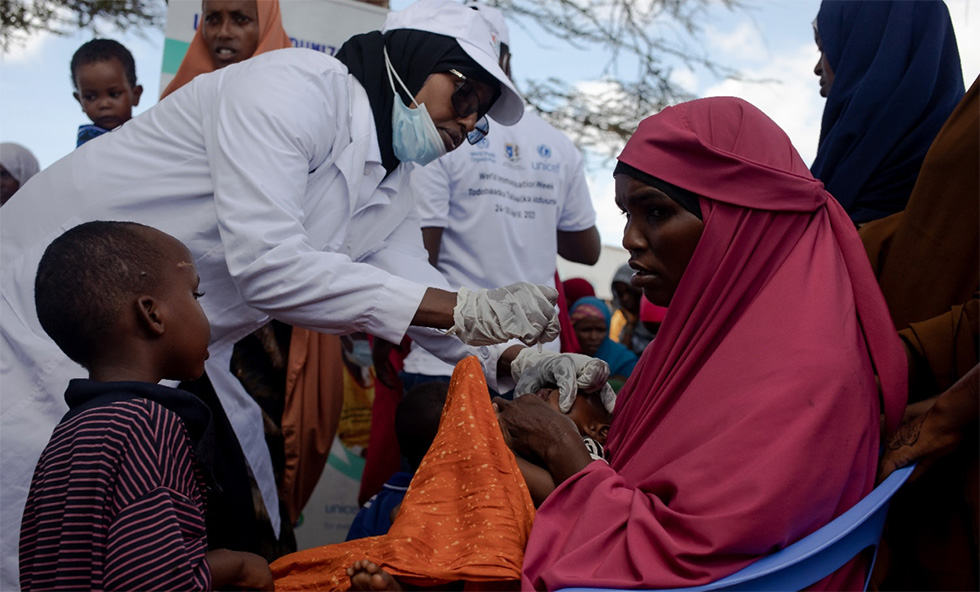 With the launch of an electronic immunization registry in Somalia, WHO Somalia and the Federal Ministry of Health plan to improve the country’s immunization profile. Photo credit: WHO Somalia/I. Taxta
With the launch of an electronic immunization registry in Somalia, WHO Somalia and the Federal Ministry of Health plan to improve the country’s immunization profile. Photo credit: WHO Somalia/I. Taxta
16 January 2024, Mogadishu, Somalia – An electronic immunization registry is set to help increase and streamline immunization coverage in Somalia, with a special focus on children who are new to immunization, defaulters, zero-dose status or underimmunized. WHO Somalia, in collaboration with the United States Agency for International Development, has supported the Federal Ministry of Health to develop and launch the digital platform.
The immunization registry consists of tools that can be used to help monitor individual immunization schedules and store individual immunization histories. As such, using the platform and its tools can help enhance the performance of the Expanded Programme on Immunization (EPI), in terms of both coverage and efficiency.
Somalia is currently managing to reach 720 000 children aged under 1 year through its routine immunization programme. Another 3.6 million children aged under 5 years are reached through special campaigns in hard-to-reach areas or via mobile teams able to help people on the move catch up with missed vaccinations.
Somalia has thus far been using paper-based registration at the individual immunization centres at primary health units, with the data then sent to DHIS2, the open-source digital database. Paper-based data and vaccination cards cannot be used, however, to track and trace children who are missed or overlooked, or whose caregivers fail to bring them for routine vaccination due to financial hardship or any number of other reasons.
“This registry will help develop individual data for each child, with a unique ID, and will be available on the system all across the country. No matter where the family has moved, they can still go to any nearby immunization centre and get their child the required vaccine, without getting a duplicate registry or missing out the previous record of immunization administered to child anywhere in the country,” explained Dr Muhammad Farid, the focal person for WHO Somalia’s Expanded prorgamme on immunization (EPI) programme.
WHO Somalia helped to develop the electronic immunization registry at the request of the Federal Ministry of Health. The country office was able to pursue this latest leap of innovation with the support of its globally recognized partner, the HISP Centre at the University of Oslo, which manages the DHIS2 project.
Previously, from August 2020 to August 2021, WHO Somalia and the HISP Centre had supported the Ministry to review and revise all data elements, indicators and data collection tools for DHIS2. This exercise helped to update Somalia’s DHIS2 platform by adding new indicators, data elements and forms on a government-owned server.
The revised DHIS2 platform has now, finally, helped to unify data relating to EPI; nutrition; the Integrated Diseases Surveillance and Response System; and HIV, tuberculosis and other health conditions.
“We are delighted that after helping us to update the DHIS2 platform, WHO has helped us to conduct training of trainers and, eventually, cascade these trainings to help the Ministry of Health, state, regional and district data officers get hands-on training sessions on the new data collection tools, data entry on the new platform, and get familiarized with the new features such as maps, data visualization and data validation rules,” observed Mohammad Abdullahi, the Federal Ministry of Health focal point for Somalia’s Health Management Information System.
For more information, please contact:
Fouzia Bano, Communications Officer, WHO Somalia
Email:
Saeed Ahmed, Reporting/External Relations Officer, WHO Somalia
Email:
Notes to editors:
For more details about WHO’s response across Somalia, see:
USAID support leads to 47% of eligible Somalis being vaccinated against COVID-19


